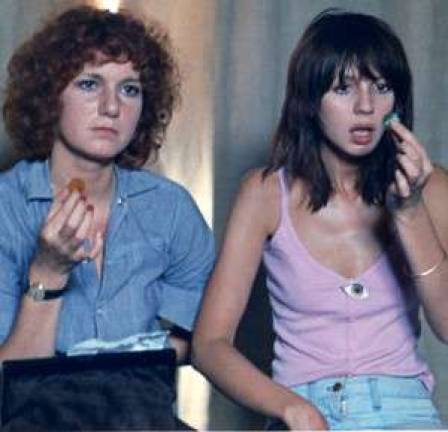Jacques Rivette's Celine and Julie Meta Movie Returns CITYARTS EXCLUSIVE: LOOKING AT A CLASSIC THAT CONFOUNDS FILM CULTURE Legend says (and an eyewitness confirms) that at the 1974 New York Film Festival press screening of Celine and Julie Go Boating, Pauline Kael walked out in the middle announcing, "I'm going to the movies!" Apparently Jacques Rivette's three-hour-plus fantasia on cinephilia wasn't movie enough for her taste. Since then, the film has gained prestige among a particular breed of cinephile?the Kael-haters who also pompously decry a particular kind of accessibility and sensual or kinetic cinematic gratification in favor of "smartness." These legions control today's discourse. Now that Celine and Julie is back (a rare engagement at Film Forum starting May 4), it's become undeniable that Kael's view of cinema has been overtaken by one that prefers the hermetic and arcane view?the "smartness"?that adorns Rivette's new cache and that Celine and Julie exemplifies. Its story of two young Parisians, curly redhead Julie (Dominique Labourier) and raven-tressed Celine (Juliet Berto) who become friends and share confidences and confidantes, parodies the production of film narrative and the expression of imagination and cultural legend. These same themes (implied in the film's Feuillade-alluding subtitle "Phantom Ladies Over Paris") were common to films of Rivette's French New Wave contemporaries Claude Chabrol, Jean-Luc Godard, Francois Truffaut and Eric Rohmer who employed less esoteric yet revolutionary methods. Rivette's deliberately obscure tale has become iconic for the elitist cinephilia that now dominates contemporary film culture; it defines the festival circuit and internet hordes whose social pretensions have further divided audiences into intellectual and anti-intellectual positions at the exact moment that tabloid journalism (alligned with Hollywood patronization) has corrupted populist approaches to cinema. Celine and Julie is whimsical yet for a comedy it's never really funny. Rivette's dry approach to improvisation and fantasy negates the kind of joy that his collaborators Labourier and Berto mean to have. This Mutt-and-Jeff duo is fascinated by magic (the movies, public performance) and imagine themselves entering a lurid melodrama from another dimension. It's all so insidey that only their ponderousness is contagious, not their supposed delight. The titular "go boating" is a French phrase for jest or joking. Yet, this laborious caprice is always regarded in somber utterances; usually by critics who deplore lively screen sex or humor. Rivette's deadpan cinephilia is what made Kael bolt in search of basic movie pleasure. To read the full piece at CityArts [click here](http://cityarts.info/2012/05/03/the-boy-who-played-with-dolls/).

